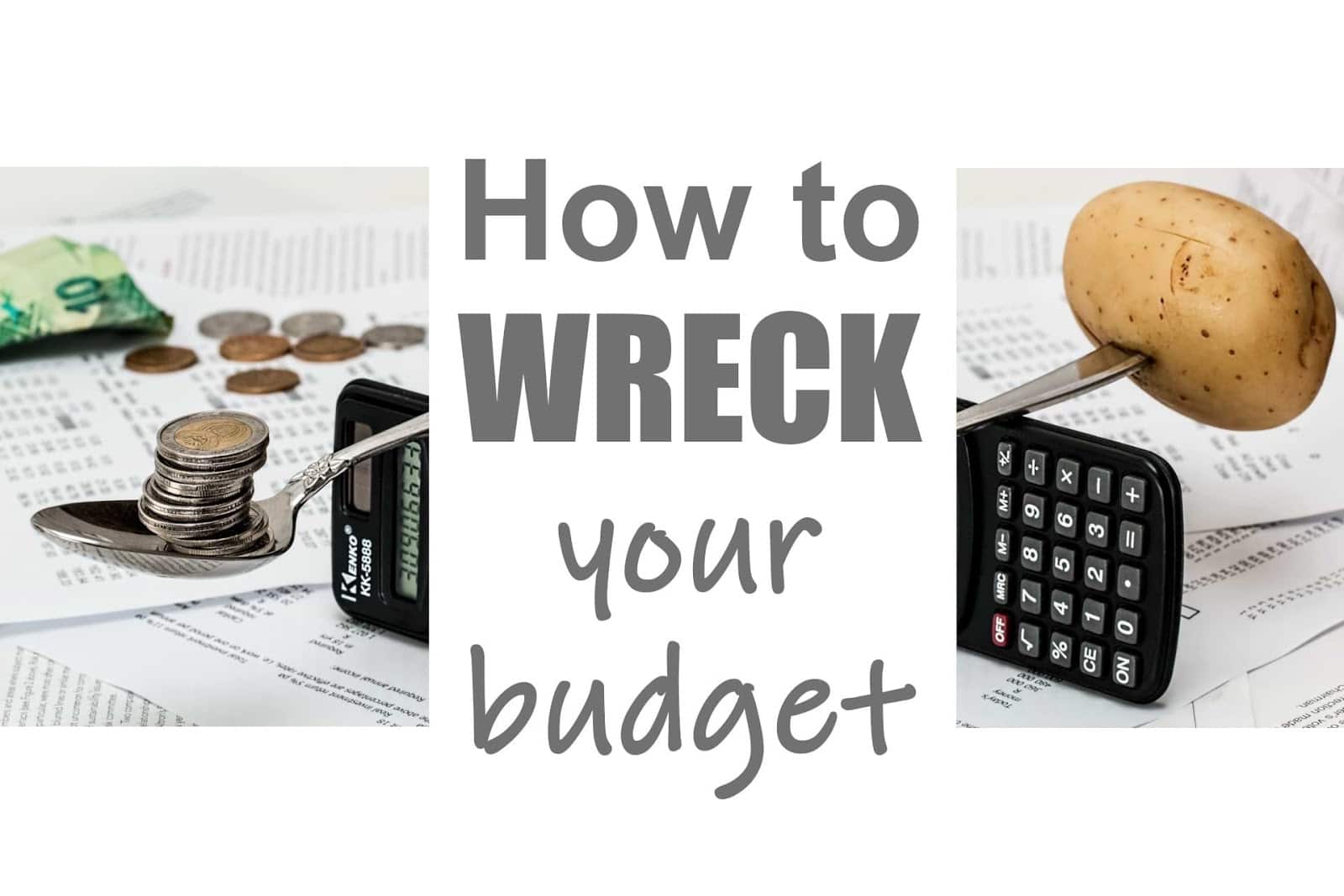You might read this headline and think –
“Wait, why would I want to do that?! I want to create a budget that works!”
Well, hang with me, because this post (and the others linked) may help you identify things you’re doing to wreck your budget without even realizing it.
For all the powerful household CEO’s (you) who spend hours pouring over their budget, but secretly feel frustrated at invisible budget busters, a small group of personal finance enthusiasts and I have collaborated to bring these hidden wrecking balls to light. The trouble is, budgets aren’t just about numbers. They’re about behavior and our ability to adjust – the spreadsheet AND our habits.
Sometimes you need to gain perspective from someone else’s lessons learned or experiences to discover budget-wrecking, unconscious behaviors or thought patterns in your own life. For this reason, I thought it’d be SO cool to not only share my tips with you but to expose you to advice from others as well.
Check out the tips shared below, consider if you or a family member behaves in this way. Find some similarities? That’s okay!
We’re sharing these tips because we’ve been there. We’ve made these mistakes and experienced a few hard-knocks too! Enjoy “meeting” each of these other money nerds (I’m so excited to help you widen your personal finance blogger circle!), and if you like their style, please do drop a comment or subscribe to their site.
Much like I’m always here, offering coaching & guidance for your budgeting woes, we bloggers are here to support each other through our business-building journey and can’t wait to celebrate our wins together!
Check out these tips below & you’ll find my tips when you click through to their sites. Enjoy!
How to Wreck Your Budget
Rochelle at https://www.rochelleadamsom.com says:
#1 Making the same mistakes but never asking for help
How many times have I done this!? Whew! Time and time again, I would make the same mistakes expecting some miracle to happen with my money. Maybe it would double in size overnight or walk itself out of the malls & back into my bank account. Nope! That’s not how life works. The next time you make a money mistake, revisit how you got there and be determined to not be in that predicament again. Educate yourself to find solutions for your pitfalls. Read some finance-related books, test run different types of budgets, etc.
#2 Not sharing my budget goals with anyone
If you fail alone, who will hold you accountable so that you avoid making that same mistake again? Do whatever you have to do to see change…grab a close friend to confide in. Someone who seems to make good money decisions & who will keep your money moves in confidence. Talking it out is one of the best things I’ve ever done to win with money.
#3 Unaware of the actual monthly bill amounts
“Oh my phone bill is about $100 this month”. This is dangerous talk right here. What if your actual bill is $110? Now you have underestimated your bill and set yourself up to possibly not have enough funds needed to care for your needs….and what’s more? If that bill is on autopay, it’s possible you could overdraft your account. Stop the mayhem by getting a hold of ALL your monthly bills. Take a screenshot if you’re on the go so that you can edit your budget to match when you have free time.
#4 Using credit cards irresponsibly
This is one of the many ways to fall into debt without even realizing it. Too many times before, I can remember swiping my cards into the thousands with no real thought or plan as to how I would pay it off. I was in over my head before I knew it. Avoid this pitfall by using debt responsibly. Identify your needs and create a budget that covers them so that you don’t even need a credit card. If you are a natural spender, find creative ways to get credit cards out of your sight (and reach) such as freezing them or cutting them up. If you are concerned about your credit score through this process, keep the cards open but don’t use them. If you choose to use credit responsibly, do so with the intention of being in control at all times.
#5 Refusing to change my budget when life happened
How many times have we counted our chickens before they hatched? Sure it’s great to budget but what about life events such as sudden job loss? I remember my job from years ago, cut hours in what was supposed to be our “busy season”. I made no adjustments to my budget and just “hoped for the best”. I don’t have to tell you what happened. Use every opportunity to tweak your budget to really make it come to life. You shouldn’t be afraid of or bored with your budget. Stay excited to look for creative ways to simplify your budget and live on less so that when the unexpected occurs, you are less likely to freak out.
#6 Not checking my bank account every day
My husband used to think I was a psychopath for checking my bank account so often. Forget every day. I check it at least 2 or 3 times a day. I notice deposits tend to occur in the mornings and withdrawals tend to happen in the evening or late at night. I don’t like surprises so the thought of waking up to a negative bank account is just not in the cards for me anymore. I use a zero-based budget so that there are no surprises. I also keep a $100 buffer in my account. It’s the same $100 I’ve had for months that originated from savings. Choose a banking system that is easy to access and that meets your needs without too much effort so that you can always know what’s going on with your everyday money. Leave the surprises for when you find that dollar down in the couch when you’re looking for the remote.
#7 Keeping my grocery budget too low (or not having one at all)
Me….and me. Yes, I’ve done both of these. I don’t know what it is about buying groceries that used to stress me out so bad. Could’ve been the $1000 bill at the cashier. That’s right. For a family of 3. With no shopping list. Just rolling up & down the aisles picking up anything that looked interesting. Bringing it all home to no meal plan. Shoving it all in the fridge with no intention of meal prepping. Stop the madness like I did. Choose to shop monthly for one big haul like we do or keep things small and shop more often so that food doesn’t sit on your shelf, withering away and drawing the attention of a feisty fly that used every piece of his being to fight to get in your house and head straight for those bananas.

Hi, I’m Rochelle, owner of my travel company, ActuallyTravels and part-time nurse. I get to live life with my best friend & hubby of 15 years, Micah. We are parents to an amazing 8-year-old girl, Eva. I love budgeting so that I can travel and travel on a budget. I spend my free time talking about the journey to debt freedom, life after debt and how to win with money no matter where you are in the process on my side of YouTube.
From Dani and Mike at https://BucksAndDough.com/:
#1 Buying the fancy clothes to get your workout on
You will not get stronger and more in shape if you have the fanciest and most expensive clothes. You can work and sweat just as hard if you are wearing a pair of shorts that have a hole in them and are stained then you will in a pair of brand new $100 shorts. You don’t have to look like a workout model to get a personal record (PR) on your back squat. If you think you have to fill up your drawers with the fanciest clothing to make you feel motivated to work out, then you need to reelevate the reason why you want to start getting healthier. Just start getting your heart rate pumping and start feeling better.
#2 Not asking for your receipt when you purchase things
If you don’t have a receipt, how are you going to be able to keep track of where your money is going? Short answer, you wouldn’t. You will just be wondering where all your money went at the end of the month. Start getting a receipt, plug it into your budget, then you can throw it away. If you don’t track where your money is coming in and out at, then good luck getting ahead with your money. Next time you are asked “Would you like your receipt?” your answer should be yes of course. Then when you get the chance, which should be within the next half hour, plug it into your budget. Easy. As. That.
#3 Leasing that nice car, thinking it is less expensive
By leasing a car, you aren’t gaining any equity in your car. When you are done with the lease, you don’t get any money back. If there is damage to the vehicle that will come out of your pocket. In most states, when you put money done on a leased vehicle you will need to pay taxes on that amount. In most cases, it will cost more to insure a leased car. For a financed or leased car, you have to include the name of the lienholder or leasing company as a named insured. Your best bet with a vehicle is to pay cash and not have to worry about a loan or leasing.
#4 Paying for a storage shed to store things you haven’t paid off yet
Storing things in a storage shed that you have to pay for monthly and then having to pay your monthly bill on the thing that you are storing is not going to help you save money and increase your net worth. That is like paying double of what your monthly payment is for that item. Stop paying to store something that isn’t paid for. And most of the time when things are in storage, they don’t get used as much as they should be. So if you get rid of the stuff in the storage shed then you also get rid of that monthly payment of the shed. A win-win!

We are Mike and Dani, also known as the Bucks & Dough Crew! We are a couple on the path to financial freedom through real estate and Entrepreneurship. And want to help others get out of the normal life and be more conscious of money. We strive to keep adventure in our lives through a budget because what’s life without a little adventure. We both grew up in Minnesota and met in Duluth. Since then, we have moved together to Ohio and Montana and found ourselves back in Central Minnesota. We are currently turning our house into a duplex, rent our house out on Airbnb, Dani runs a Nature Camp taking kiddos hiking biking and kayaking called Dani’s Nature Camp and Mike is a realtor specializing in hunting land and recreational properties. We love adventure and are the happiest outside.
Introducing Kofi at https://400lbelephant.com/– his tips are:
#1 Giving money to family and friends unexpectedly.
I have family back in Ghana and here in the US whose businesses have been terribly affected by COVID and have lost all sources of income. Well since they’re family of course I help them out but quite frankly it halts progress in saving, investing, and making progress in my financial journey. It might sound crass or cavalier but there’s no end date to Coronavirus and giving endlessly while trying to get out of debt can slow down your progress.
#2 Not price shopping or looking for coupons, especially for things like electronics or home appliances.
Maybe you feel like you’re getting the best deal only to see the same product at another retail store for several hundred dollars less…womp womp.
#3 But it was on sale.
It was a steal…Was it? You know they’ll run the same special for Labor Day, memorial day, mother’s day, father’s day, and any day they can use to lure you into thinking it was a good deal. Just because something is on sales doesn’t mean you need to buy it and it might not be a great deal. Ask yourself is it a want or a need? Can you budget for this and wait a little longer to get it at another time with saved money to buy what you’re looking for? If the answer is yes then trust me, my friend, it can wait
#4 Uhh did you forget about your friend’s baby shower?
It’s tomorrow and now you’re scrambling for diapers, bugger sucker machines, baby wash, and you mysteriously rack up a $78 bill at Target.
I’ve been there. Roaming through the diaper aisle asking strangers with small children for suggestions for baby shower gifts. Let me tell you those gifts are expensive! Better to plan for these occasions and not ruin your budget.
#5 Spending money you don’t have but plan on getting
This doesn’t work so well or ever in my experiences. Sometimes we plan on a raise, a bonus, or a friend paying you back. Well, maybe not the last one but a refund check. Some of us got a $1,200 stimulus check. Some folks spent every penny before the money hit their bank account or before their check arrived in the mail.
#6 My personal favorite. Overspending on food.
Last night we took a walk after eating dinner pretty late and before we opened up the door, I was craving ice cream. I fought my urges to get a late-night snack. This happens when we’re grocery shopping and I walk past frozen pizza which is not on the list. The point is we budget food, snacks, desserts, and sometimes we act impulsively to buy pizza or sushi which can add up and be a budget buster.

Kofi Gyebi is the founder of 400LB Elephant, a personal finance company that helps young professionals achieve financial peace. His coaching empowers people to get out of debt, save money, and build generational wealth. Kofi’s own debt-free journey is a testament to what is possible with a bit of focus and discipline: he paid off $34,000 of student loans in one year. He is a community leader, recognized as a Champion of Justice and Equality by the Urban League of Greater Atlanta. Kofi is a graduate of Bowling Green State University as well as the 2018 Leadership Buckhead Program and LEAD Atlanta, class of 2019. You can find him on Instagram or via Twitter. His dream is to inspire a generation to become debt-free and to start building generational wealth through empowering those who are ready to take the step to rid their personal debt.
From Roxanne at https://www.financerox.com/:
#1 Banish it to a drawer.
Drawers are where budgets go to die. This is probably the biggest mistake I see my personal finance coaching clients making: They take the time to draft a beautiful and ambitious budget and then put it in a drawer and never look at it again. How can we expect ourselves to stick to a budget if we never look at it and compare it to our actual spending to see how we are doing throughout the month? How many budget dollars do you have left? How much money have you spent? Do you need to cut back in one category since you overspent in another? Can you afford that $ 200-weekend trip you hadn’t planned? Banish your budget to a drawer and you will never know!
#2 Not changing any of your day-to-day actions.
Do you ever get to the end of the month and wonder: “Why didn’t I save any money this month?” It might be because you didn’t actually take any action or change any habits. Our money comes in and goes out every day. In order to capture some and save it for the goals we listed on our budget, we have to act proactively. To save more money we have to take more action. Whether it is a little thing like making the call to cancel that streaming service you haven’t used in months or a big thing like doing a weeklong “No Spend” challenge, we have to take action to make our budget work.
#3 Buy a lot of beverages.
To wreck your budget, buy all the beverages you can; whether it’s bottled water, alcohol, soda pop, juice, coffee or tea. Your new rule should be that tap water is beneath you. Seriously though, beverages have sneaky ways of wrecking our health and our wallets. They are sneaky because they taste so good and we can consume quite a bit and not really feel full. This affects our wallets too. The average American household spends about $2500 per year on just coffee ($1100), soda pop ($850) and alcohol ($550). That’s $208 per month for what is mostly empty calories!
#4 Expecting yourself to change your entire lifestyle and all your money habits the first month you write a budget.
I’m an ambitious person. When I set a goal, I want to see progress fast. This leads me, and many people, into an expectation that the first time we write a budget, we will miraculously spend $0 on discretionary purchases. This is just not realistic. It takes time to dial in a budget so that it is both realistically achievable yet ambitious enough to hit our goals. We need to be more kind to ourselves and really understand that each habit we have is deeply ingrained and will take time to change. The recipes we cook, the restaurants we visit, the shows and movies we enjoy, the activities we attend with friends and family; basically every aspect of our lives affects our finances. It just takes some time to chip away at those so that we can hit those ambitious budgets. It took about 6 months of budgeting for my husband and I to figure out a realistic budget that fit both our life and our goals.

Hey, I’m Roxanne from FinanceRox.com! I’m a personal finance coach, blogger, YouTuber, and by day, financial analyst. I want to help people reduce their financial stress and find more confidence and joy in their finances by paying off debt and saving more money. Having grown up below the federal poverty line, money has always been my top priority. After graduating with my degree in Accounting, my husband and I went on to pay off $49,000 of debt and bought a $210,000 house in cash. Now we are saving aggressively for Financial Independence and our goal is to hit F.I.R.E. by age 39.

0 Comments
Trackbacks/Pingbacks